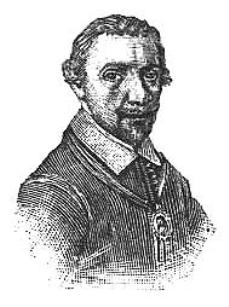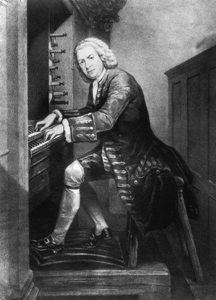J.S. Bach - Jesu Bleibet Meine Freude (Jesu Joy of Man's Desiring)
J.S. Bach - Jesu Bleibet Meine Freude (Jesu Joy of Man's Desiring)
In the twenties of the seventeenth century Johann Sebastian Bach was hired as a church music director in Leipzig. The terms of employment included inter alia writing new cantata each week for the Sunday’s Mass. Bach usually started the work on Monday and he composed and copied notations for particular instruments for four days, including Thursday. On Friday a first trial run took place and on Saturday a performance was being perfected. A premiere took place on Sunday at 8 a.m. during the Mass.
From a viewpoint of time such condition seems to be deadly for a composer, but at the time no one saw anything unusual about it. Nevertheless, even such a hard worker like Bach had enormous difficulties of meeting deadlines. It should be no surprise that he often drew from already existing pieces of which various parts he placed into his new compositions or he simply built on other artists’ work.
One of cantatas written in Leipzig was 'Herz und Mund und Tat und Leben' (‘Heart and Mouth and Deed and Life’). It was classified by Schmieder as BWV 147. It was performed for the first time on July 2nd 1723.
J.S. Bach – Jesu Joy of Man’s Desiring
The piece was written for trumpet, oboe, bassoon, two violins, viola, basso continuo and four voices chorus: soprano, alto, tenor and bass. It consists of the following parts:
1. Chorus: "Herz und Mund und Tat und Leben"
2. Recitative: "Gebenedeiter Mund!"
3. Aria "Schäme dich, o Seele nicht"
4. Recitative "Verstockung kann Gewaltige veblenden"
5. Aria "Bereite dir, Jesu, noch itzo die Bahn"
6. Chorale "Wohl mir, daß ich Jesum habe"
7. Aria "Hilf, Jesu, hilf, daß ich auch dich bekenne"
8. Recitative "Der höchsten Allmacht Wunderhand"
9. Aria "Ich will von Jesu Wundern singen"
10. Chorale "Jesu bleibet meine Freude"
Chorales from parts 6 and 10 weren’t Bach’s original compositions. The melody was written by Johann Schop (1590-1664), and the lyrics were created by Martin Jahn (Janus) in 1661. Bach harmonized and orchestrated Schop’s melody.

Johann Schopp (1590 - 1667)
The suite’s ending chorale became one of the most famous pieces composed by Johann Sebastian Bach. It was thanks to the transcription for piano by English pianist, Myra Hess (analogical situation happened with the Aria on a G String – see note:Aria).
Hess published her version in 1926 for solo piano and in 1934 for two grand pianos. Robert Bridges, who was a poet, translated the lyrics from German to English and named it ‘Jesu Joy of Man’s Desiring’.
Since then ‘Jesu bleibet meine Freude’ was arranged for all instruments, their variations, choirs, orchestra and solo vocalists. The biggest orchestras and singers have it in their arsenals. There are also adaptations for pop, not classical, but they rarely are successful.
In Anglo-Saxon countries ‘Jesu Joy of Man’s Desiring’ is played at weddings. It is colligated with Christmas. It is also used in many movies – for instance in the last 10 years the chorale was present in the soundtracks from 13 different movies.
For me personally it is the out-and-out upper crust of my favourite music pieces. ‘Jesu bleibet meine Freude’ is my most frequently listened-to piece. I have more than 60 different versions. Some of them are poor, but some others are causing the thrills twinkling around my back, magnificent they are. Something wonderful.
In Music Box there are 10 different executions. From ‘pop’ covers only Josh Groban, others are rather weak. There’s Jaques Loussier Trio, great Jazz band of whom classical hits transcriptions are excellent.

Johann Sebastian Bach
Original German lyrics
Jesus bleibet meine Freude,
meines Herzens Trost und Saft,
Jesus wehret allem Leide,
er ist meines Lebens Kraft,
meiner Augen Lust und Sonne,
meiner Seele Schatz und Wonne;
darum lass' ich Jesum nicht
aus dem Herzen und Gesicht. (BWV 147, Chorale nr 10)
Wohl mir, dass ich Jesum habe,
o wie feste halt' ich ihn,
dass er mir mein Herze labe,
wenn ich krank und traurig bin.
Jesum hab' ich, der mich liebet
und sich mir zu eigen giebet,
ach drum lass' ich Jesum nicht,
wenn mir gleich mein Herze bricht. (BWV 147, Chorale nr 6)
English translation
Jesu, joy of man's desiring,
Holy Wisdom, Love most bright;
Drawn by Thee, our souls, aspiring,
Soar to uncreated light.
Word of God, our flesh that fashion'd,
With the fire of life impassion'd,
Striving still to truth unknown,
Soaring, dying, round Thy throne.
Through the way where hope is guiding,
Hark, what peaceful music rings!
Where the flock, in Thee confiding,
Drink of joy from deathless springs.
Theirs is beauty's fairest pleasure;
Theirs is wisdom's holiest treasure.
Thou dost ever lead Thine own
In the love of joys unknown.
A full notation chart can be found here:http://members.tripod.com/~bvmusica/bach_joy.pdf, PDF file
Last Updated (Wednesday, 11 March 2015 21:00)








